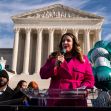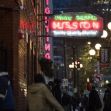In yet another decision that displays the justices’ commitment to protecting religious freedoms, the US Supreme Court ruled that the City of Philadelphia could not refuse to work with a Catholic agency that refused to place children with same-sex foster parents.
The case, titled Fulton v. Catholic Social Services, was being carefully watched as a harbinger of the current court’s stance on whether exceptions to anti-discrimination laws should be granted in order to protect religious freedoms and expression. Many legal scholars have concluded that the court, in a 9-0 ruling favoring CSS, stated loud and clear that religious freedoms are deserving of greater protection than those of LGBTQ+ persons to receive equal treatment.
Richard Garnett, the director of the program on church, state, and society at Notre Dame law school, opined, "It is striking, and telling, that the court's more liberal justices joined the court's decision. Today's ruling illustrates that respect for religious freedom should not be a partisan, or left-right issue."
Centuries-old foster agency contract terminated when discriminatory policies come to light
Catholic Social Services (CSS) is a branch of the Catholic Archdiocese of Philadelphia. It is one of 30 organizations that has a contract with the City of Philadelphia to place children into foster families who were removed from abusive or neglectful homes. CSS has been providing similar services for roughly 200 years. The contract between the City of Philadelphia stated that contractors for foster child placement agreed not to discriminate against LGBTQ+ couples when screening foster parents. Nevertheless, in 2018, a piece in the Philadelphia Inquirer exposed the fact that CSS did, indeed, refuse to place children in the care of same-sex foster parents. The City of Philadelphia terminated its contract for foster child placement with the agency once this report became public. CSS filed suit, claiming that its First Amendment right to freely express its religious convictions had been violated by the City’s actions.
Chief Justice John Roberts, the author of the majority opinion, wrote, "The refusal of Philadelphia to contract with CSS for the provision of foster care services unless CSS agrees to certify same-sex couples as foster parents violates the Free Exercise Clause of the First Amendment. CSS seeks only an accommodation that will allow it to continue serving the children of Philadelphia in a manner consistent with its religious beliefs; it does not seek to impose those beliefs on anyone else."
Decision falls short of conclusive ruling sought by conservatives in support of religious freedom
While LGBTQ+ advocates were disappointed with the ruling, the court’s opinion is narrower than many advocates of religious freedom had wanted. Many conservative court watchers saw Fulton as an opportunity for the court to overturn a 1990 decision titled Employment Division v. Smith. This decision, authored by Justice Antonin Scalia, held that the government was permitted to impose “generally applicable” restrictions which had an “incidental” effect on religious groups, so long as those restrictions were neutrally enforced between secular and religious entities.
Chief Justice Roberts’ opinion addressed the failure to overturn Smith by stating that, in contrast to the holding in Smith, the policy being challenged in this case was not generally applicable since it permitted the city to provide other exceptions. “No matter the level of deference we extend to the City, the inclusion of a formal system of entirely discretionary exceptions” in its standard foster care contracts “renders the contractual nondiscrimination requirement not generally applicable,” the opinion explained.
In his concurring opinion, Associate Justice Neil Gorsuch criticized the majority’s refusal to overturn the Smith decision, describing it as a “sidestep” of the most pressing question at issue in the case. Associate Justice Gorsuch went on to write, "They say, there’s no 'need' or 'reason' to address the error of Smith. On the surface it may seem a nice move, but dig an inch deep and problems emerge."
In a concurrence penned by Associate Justice Samuel Alito and joined by Associate Justices Gorsuch and Clarence Thomas, the majority opinion was described as being so toothless that it “might as well be written on the dissolving paper sold in magic shops. . . if the City wants to get around today’s decision, it can simply eliminate the never-used exemption power.” The Alito concurrence went on to call the Smith decision “ripe for reexamination.” Many conservatives had hoped that the Fulton case could result in a rule that categorically permitted religious entities to be exempt from similar anti-discrimination statutes.






